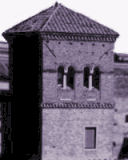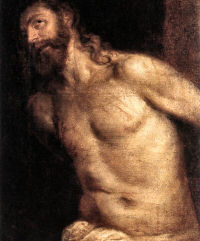Make your gift today!
Help keep Catholics around the world educated and informed.
Already donated? Log in to stop seeing these donation pop-ups.
» Enjoy our Liturgical Seasons series of e-books!
"The Lord is my light and my help; whom shall I fear? The Lord is the strong hold of my life; before whom shall I shrink?"
The Station in Rome is in the church of St. Praxedes, dedicated to a virgin who devoted herself wholly to acts of charity toward her neighbors and to caring for martyrs: "Some she hid in her house, some she exhorted to profess the faith courageously, others she buried. To all who languished in prison she brought whatever they needed. When she no longer could witness the cruel oppression of the Christians, she besought the Lord, if it were His will, to take her from this valley of tribulation. This was granted. On July 21 God summoned her to receive a heavenly reward in return for her love of neighbor and holiness of life."
Meditation for Monday of Holy Week—Mary and Judas
Today the liturgy presents two noteworthy characters who play dissimilar roles in the Lord's passion. One fills us with solace and comfort; the other with uneasiness and wholesome fear. Their juxtaposition produces a powerful effect by way of contrast. The two characters are Mary of Bethany and Judas.
Jesus is in the house of Lazarus, at dinner. Mary approaches, anoints the feet of her Savior for His burial and dries them with her hair. Judas resents her action and resolves upon his evil course. These two persons typify man's relation to Christ. He gives His Body to two types of individuals: to Magdalenes to be anointed, to Judases to be kissed; to good persons who repay Him with love and service, to foes who crucify Him. How movingly this is expressed in the Lesson: "I gave My body to those who beat Me, and My cheeks to those who plucked them. I did not turn away My face from those who cursed and spit upon Me."
The same must hold true of His mystical Body. Down through the ages Christ is enduring an endless round of suffering, giving His body to other Marys for anointing and to other Judases to be kissed, beaten, and mistreated. Augustine explains how we can anoint Christ's body:
Anoint Jesus' feet by a life pleasing to God. Follow in His footsteps; if you have an abundance, give it to the poor. In this way you can wipe the feet of the Lord.
The poor are, as it were, the feet of the mystical Christ. By aiding them we can comfort our Lord in His mystical life, where He receives Judas' kisses on all sides-the sins of Christians.
The Gospel account may be understood in a very personal way. In everyone's heart, in my own too, there dwell two souls: a Judas-soul and a Mary-soul. The former is the cause of Jesus' suffering, it is always ready to apostatize, always ready to give the traitor's kiss. Are you full master over this Judas-soul within you? Your Magdalen-soul is a source of comfort to Christ in His sufferings. May the holy season of Lent, which with God's help we are about to bring to a successful conclusion, bring victory over the Judas-soul and strengthen the Magdalen-soul within our breasts.
—Excerpted from The Church's Year of Grace, Pius Parsch

Monday of Holy Week
Station with Santa Prassede all'Esquilino (St. Praxedes):
The Station today is at the church of St. Praxedes which was built over St. Praxedes' home. It was one of the twenty-five original parishes in Rome. It is easily one of the most beautiful churches in the Eternal City and is bedecked with incredibly beautiful mosaics. The present church is the one built by Pope Adrian I c. 780, completed and altered by Pope St. Paschal I c. 822. It was enlarged at that time mainly to serve as a repository for relics from the catacombs.
For more on Santa Prassede all'Esquilino, see:
- Churches of Rome
- Rome Art Lover
- Roman Churches
- PNAC
- Aleteia
- Station Church
- The Catholic Traveler
- The Geographical Cure
For further information on the Station Churches, see The Stational Church.
Meditation for Monday of Holy Week: The Theme of Patience
Today's station church, which houses the Chapel of St. Zeno and its exceptionally beautiful mosaics, offers an apt occasion for reflection on one of the most difficult of pieces to fit into the mosaic of discipleship: patience—a recurring theme in today's Mass and Office of Readings. According to the traditional catalogue of "fruits of the Holy Spirit," patience is one of those perfections into which Lenten pilgrims must grow, as the itinerary of conversion gradually equips us to become the kind of people who can enjoy the glory of eternity within the light and love of the Holy Trinity. "Gradually," of course, suggests that growth in patience is, more often than not, an exercise in patience.
The theme is introduced in the first reading at Mass, the first of the four Suffering Servant songs in Isaiah. Here, the chosen servant of the Lord is depicted as a man of godly forbearance, familiar with the weakness of humanity, who will reshape history according to the patient rhythms of the divine mercy:
Behold my servant, whom I uphold
my chosen, in whom my soul delights; I have put my spirit upon him, he will bring forth justice to the nations. He will not cry or lift up his voice, or make it heard in the street; a bruised reed he will not break, and a dimly burning wick he will not quench; he will faithfully bring forth justice. He will not fail or be discouraged till he has established justice in the earth; and the coastlands wait for his law.
Patient waiting for the working out of the divine plan of salvation history is also the lesson taught by the psalmist in response to Isaiah's portrait of the noble Servant of YHWH. As sung by the Church, the first and last verses of Psalm 27 are a confession of faith in the coming Kingdom—no matter how long delayed its advent may seem—and an admonition to patient, courageous, watchful waiting along the pathways of history:
The Lord is my light and my salvation; whom shall I fear? The LoRD is the stronghold of my life; of whom shall I be afraid?
I believe that I shall see the goodness of the LORD in the land of the living! Wait for the LORD; be strong, and let your heart take courage; yea, wait for the LORD!
The gospel reading for the day continues the story of Jesus's friendship with Martha, Mary, and Lazarus, which, read through the prism of today's theme, appears as an ongoing lesson in patience. At their first encounter in Luke's gospel, when a family disagreement breaks out over whether the duties of hospitality are being ignored, Jesus teaches Martha and Mary patience with each other: there is a place for work and there is a time for contemplation, but listening to the Lord should always inform the active life. Now, Mary anoints the feet of Jesus with a precious substance and dries them with her hair, and Judas complains about the waste of money this extravagance represents. Jesus tries—in vain, as the gospel of John has it—to teach Judas patience; seen with the eyes of faith, Mary's anointing is not a waste of money, but a preparation for Jesus's burial.
In the Office of Readings, the author of the Letter to the Hebrews teaches his readers that patience is required to align our lives with the divine master plan, which, from our perspective, can sometimes seem stalled: "You have need of endurance, so that you may do the will of God and receive what is promised." What can seem to us delay is in truth the divine patience at work within history; what can seem a lengthy delay is but a "little while" when we remember that the Lord of history is in charge of history.
The English word "patience" comes from the Latin verb patior (to suffer], so that, etymologically, "patience" means "to suffer with" or "to bear with." If patience is one of the fruits of the Holy Spirit [Galatians 5.22], given in Baptism and Confirmation, then, for the Christian, the ultimate source of patience—the power to "bear with" and "suffer with" others—is the Cross. For nowhere is the divine patience more strikingly manifest than at Calvary. In the patristic selection in today's Office of Readings, St. Augustine reflects on this theme: "The Passion of our Lord and Savior Jesus Christ," he preaches, "is the hope of glory and a lesson in patience." The Word through whom the cosmos was created patiently takes a human nature precisely so that he might "suffer with" those desperate for forgiveness and redemption. As he shares in our humanity, so his burning desire to "bear with" us by bearing the Cross empowers us to share in his divinity, through the blood and water that evoke Baptism and the Holy Eucharist. Therefore, Christians should not regard the Cross as something shameful, but as something in which to boast:
The death of the Lord our God should not be a cause of shame for us; rather, it should be our greatest hope, our greatest glory. In taking upon himself the death that he found in us, he has most faithfully promised to give us life in him....
Brethren, let us then fearlessly acknowledge, and even openly proclaim, that Christ was crucified for us; let us confess it, not in fear but in joy, not in shame but in glory.
Pope Benedict XVI's 2011 Lenten message to the Church offered a similar challenge. Reflecting on the Second Vatican Counci'ss teaching that the Church ought to recover the baptismal character of Lent, the Pope noted St. Paul's teaching, in his Letter to the Philippians, about the transformation that begins in us through our baptismal participation in the events of Good Friday and Easter. The life of grace, the Apostle wrote, is one in which we are constantly being conformed to the patiently suffering Christ of Calvary, so that we might be strengthened in our hope of sharing in his resurrected glory: as Paul prayed that he may "come to know him and the power of his resurrection, and partake of his sufferings by being molded to the pattern of his death, striving towards the goal of resurrection from the dead" [Philippians 3.10-11], so twenty-first-century Christians, according to Benedict XVI, must allow the power of Baptism to inform our "entire existence," which thereby becomes an "encounter with Christ. imparting divine life."
Deep conversion means being molded into "the pattern of [Christ's] death, so as to share in the glory of his Resurrection. There are neither accidents nor coincidences in the economy of salvation. The patience of the Suffering Servant on Good Friday is the necessary prelude to the exaltation of that same Servant on Easter.
—George Weigel, Roman Pilgrimage: The Station Churches






